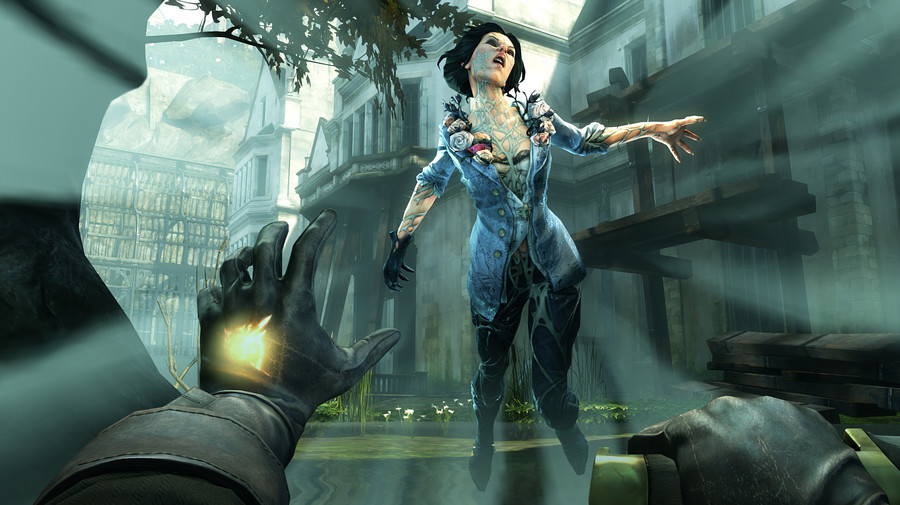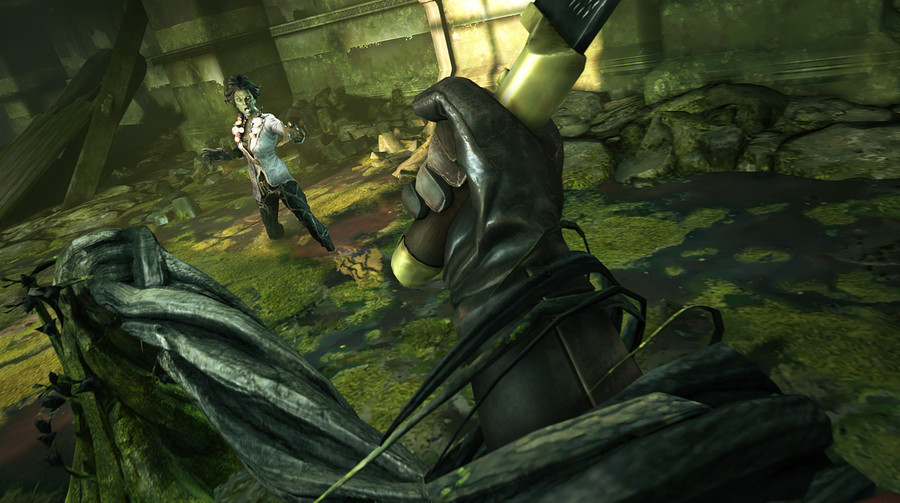I may finally have to pull Dishonored out of the stack of games that I have finished, but not quite completed to my own satisfaction.
Dishonored: The Brigmore Witches Review
|
|
See PixlBit's Review Policies

On 08/20/2013 at 12:00 PM by Travis Hawks Bestill my mechanical heart, Dishonored has returned to greatness. |

If you liked Dishonored at all, get both The Knife of Dunwall and The Brigmore Witches.
The previous piece of Dishonored DLC, The Knife of Dunwall, left me feeling slightly let down. Although it had the basics I loved from the main game – multiple pathways, interesting powers, and stealthy maneuvering that was top notch – the story and environments weren’t up to the new franchise’s high standards. The Brigmore Witches washes away all of my misgivings and brings things back my lofty expectations for the franchise.
Picking up right at the end of The Knife of Dunwall, you’re back in the role of master assassin, Daud. The coven of witches and their leader, Delilah that you sought in the previous chapter are hatching a big scheme that can only be foiled by someone as skilled as Daud – with a little help from The Outsider, of course. Since you’re a filthy underworld figure, your plans involve other filthy underworld figures, sending you back to Coldridge Prison, the setting of the opening level of the main game.
Starting back at the prison had me worried that this installment would be filled with a lot of augmented recycled levels as found in The Knife of Dunwall. Fortunately, this opening level is the only time you really run into a rehashed location, and even the prison is supplemented significantly to make it exciting to return to. The other two main locations are brand new and filled with the little discoveries that made me fall for Dishonored in the first place. This is especially true of the final area, set in a dilapidated manor and its surrounding grounds that are lush and green inside and out – a big departure from the crumbling Dunwall urban areas we’re used to.
My beefs with the fizzling cliffhanger finale to The Knife of Dunwall’s story were quickly erased as I began my search for Delilah again. There is a definite sense of purpose in your quests this time, and a real sensation that you’re the only person who will be able to get things set right. No more running little errands to pass the time, as seen in the previous chapter. Notes, books, and graffiti scattered about were back up to par too, and they gave me many moments of feeling unsettled or in awe at the little tales tucked into the corners. One or two little tableaus even left me a little nauseated, but in a good way (if that’s possible).
Collecting a few of the doo-dads has been made even easier this time thanks to the new Pull power you can unlock. It’s the only addition to the slate of possible abilities for Daud, which is a little disappointing since his capabilities were already lacking when compared to Corvo’s to begin with. It’s just enough of an addition to give you a new toy to play with, though, and it works well enough. Pulling items across the room can be handy when you’re lurking in the shadows, but using the ability in combat seemed a little silly. I didn’t find much benefit from yanking opponents closer to me, but I still did it from time to time just for kicks.
There are still plenty of runes around to unlock the interesting abilities early on, which leaves you no choice but to spend a few on the ho-hum ones like health increases. The lack of scarcity on runes this time around was compensated for by the economy of purchasing items between levels. You are again given the option to pay for a few favors at the start of each level – have someone leave a door unlocked, have some equipment left behind, and so on – as well as purchasing extra weapons, gear, and upgrades. Even though I typically sought out and collected lots of items worth lots of coins, I wasn’t typically able to pay for all of the favors or many extra supplies or upgrades. This made me plan out my strategies a bit more than I had in any other portions of Dishonored. In the main game, it was all about finding and cashing in runes, whereas now it seems as though money has become even more important to your strategy – a fitting scenario for a true underground assassin type.
I did hit a couple of bugs along my way, but neither turned out to be much of an issue. I found myself stuck amongst some trees at one point, which forced me to load my previous save, without much time lost. The other incident was a bit more troublesome when an old man was about to tell me a combination code and just stopped talking mid-sentence. Luckily, the code was automagically recorded in the journal for me so I was able to proceed without repeating much. Again, both of these incidents were pretty minor, and didn’t leave me questioning the game’s quality. In fact, except for the content’s length, everything seemed up to snuff with a full-fledged game.
It definitely feels like they took more time balancing the systems for this installment than the last one, and added a few extra layers of polish too. Any fan of Dishonored would be remiss not to play through both The Knife of Dunwall and The Brigmore Witches. The story of Daud becomes intriguing and even a bit touching once you play through both. Even though it would be hard to make little packages of content like these live up to the full game, The Brigmore Witches gets amazingly close.











Comments